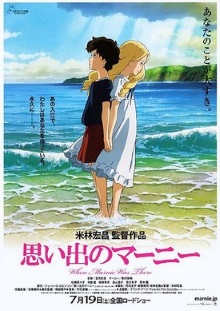
When Marnie Was There is supposedly Studio Ghibli’s final film, or at least it is until such time as Hayao Miyazaki decides to un-retire again or someone else decides to resurrect the studio. This one was actually directed by Hiromasa Yonebayashi, perhaps best known for The Secret World of Arrietty. Like Arrietty, it’s also based on a children’s book by a British author, in this case one originally published in 1967. I don’t know about you but I always feel that it’s kind of sad when authors don’t live long enough to see their work reach a far wider audience than they’d ever imagined.
Like many other Studio Ghibli creations, this one has a female protagonist. Anna Sasaki is a young and sickly girl living with foster parents. The knowledge that she was adopted makes her hold herself apart from other children, so instead of making friends and playing with them she spends her time sketching by herself. After she collapses from an asthma attack one day, her mother sends her away to spend the summer with relatives in a rural area with clean air. There she discovers a beautiful but abandoned mansion across the marshes and befriends the strange girl who seems to live in it.
The stories of the lives of both Anna and the elusive Marnie is revealed to the audience only bit by bit, lampshaded in the scene in which the girls promise that they will only ask three questions of each other each night. It comes as no surprise that a big part of the mystery of this film is about wondering whether or not Marnie is actually real, given how ghost-like she and even her mansion seem. Like many animated films from Japan, it successfully conveys the very Japanese quality of seeing value in the ephemeral and the sense of losing what is always acknowledged to be merely transient.
Unfortunately, while competently executed, When Marnie Was There ultimately lacks originality or any real magic. The story arc proceeds along fairly predictable lines and by the time it arrives, the final twist is no twist at all. Even the artwork is unremarkable. It looks nice, sure enough, and I especially appreciated the quiet majesty of the mansion that is so central to the story, but nothing particularly stands out. At one point, the film hints that one reason why Anna feels alienated from everyone else is that her physical features include Caucasian traits. That would have been an interesting aspect of her life to explore but it’s never followed up on.
Even though it’s an average film, it’s still fairly enjoyable and pleasant to watch. Such is the studio’s experience and skill that you feel buoyed along with the emotional peaks even as you’re fully aware of what the film is doing and what will be coming next. It’s far from the best of what this studio has done in the past but as Broken Forum posters like to put it, it’s a perfectly cromulent piece of entertainment.